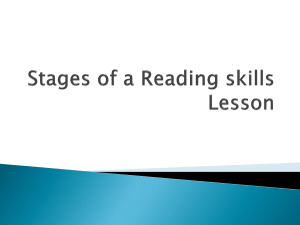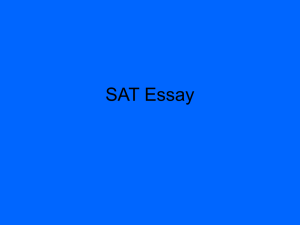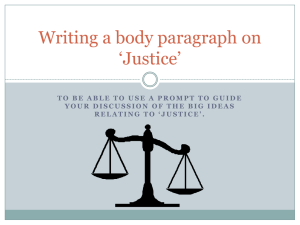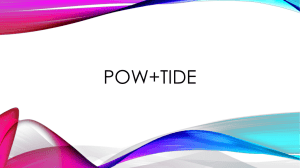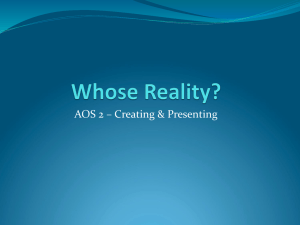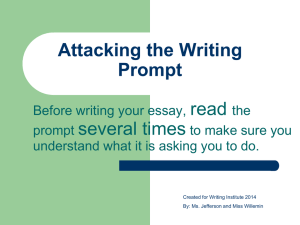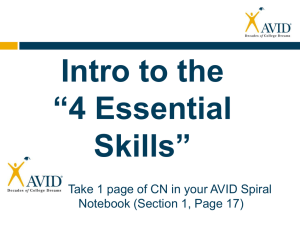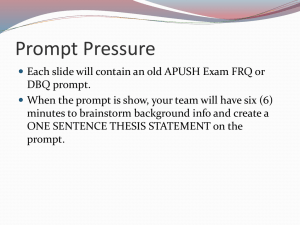conflict2012 - WordPress.com
advertisement
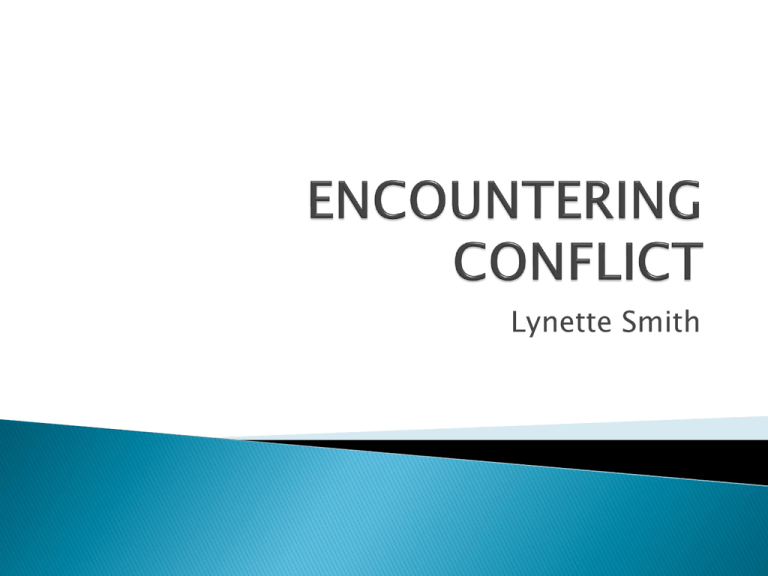
Lynette Smith You have had to: “Be able to draw on ideas and /or arguments suggested by a chosen Context to create written texts for a specified audience and purpose; and to discuss and analyse in writing their decision about form, purpose, language, audience and context” In the exam, you have to: “Write for a nominated audience and purpose drawing on ideas suggested by their selected Context drawing directly from at least one text selected from a list” But there are important and essential differences that you must be aware of: During the year you may have been given a selection of prompts by your teachers to respond to –in the exam you have one unseen prompt that may incorporate visual material During the year you had to draw on the ideas from a text—in the exam you must draw DIRECTLY from at least one text During the year you had to provide a written explanation that discussed you choices about audience, form etc—in the exam you do not provide such a statement --so how do you make a particular style obvious????? No written explanation means that you cannot explain what you are trying to achieve—you must achieve it! I.e. If writing a speech directly address the audience at the start eg” Welcome to the fifth annual Student Welfare coordinators conference” If writing a feature article—give a headline If writing from different perspectives make it clear by colour, subheadings etc. If you are writing a diary/journal—address yourself at the start If doing an expository essay—still think of your audience MAKE IT CLEAR EVEN TO EXAMINERS!!!!! Your response will one unseen prompt which may include some visual material.—you have to read the prompt, understand its underlying concepts and the “big idea” that links it to your study of the context. Then you need to develop a piece of writing that shows the assessor that you have considered the prompt. If you ignore the prompt no matter how well you write you will not achieve a top grade. As there is only ONE prompt –you must thoroughly revise as many aspects of the context as possible “Students must respond to the prompt. While a prompt can be seen as a springboard for ideas in relation to the context, the piece of writing must deal with the ideas the prompt itself offers. The most successful scripts showed insight into the implications of the prompt. Some students ignored the prompt completely.” (Assessment reports 2011 –VCAA website) You must draw on a text –BUT NOT WRITE A TEXT ESSAY. Many students used the prompt a starting off point to discuss the text in an argumentative way as in part A. Now while this showed excellent knowledge of the text it did not show understanding of the context itself. “While this is a clear instruction that the text drawn from must inform the writing in ways that must be clear to the reader and that the student has used it effectively “ as appropriate to the task”. In the examination students who compose seemingly gratuitous creative pieces or simply label one of their characters ‘Abigail’, ‘Blanche’ or ‘Holden’ have not fully examined or explored the ideas of the text in relation to the prompt. They must ensure that the connection between the piece of writing and the nominated text is discernible and central in the ideas of their pieces. The most successful responses drew thoughtfully from the text; however, the least successful only used a scene or a feature of character in a superficial way or retold the plot of the text. (Assessment reports 2010, 2011 –VCAA website) EXAMPLES During the year you have looked at examples from history, your own life and the news to explore and discuss the context BUT You do not have to refer to an outside example There are no bonus marks for the amount of references .Students who used more than one source to illustrate their ideas often produced pieces with a strong sense of unity and purpose. This cohesiveness was contrasted by pieces where one idea followed the next as students went through their list of examples. The product was more a plan for an essay than a thoughtful, finished piece. Can I use outside information? Is it checked? Do creative responses earn more marks than expository? Can I refer to a Part 1 text such as 12 angry men which would suit this context? Do I need to use quotes? Should I use more than one text as the basis of my piece? Can I use ideas I have put in an essay before? Quality of Writing Quality of ideas Handling of the prompt Causes of Conflict? What is it that leads to conflict, is it really the lid off the toothpaste or is it more? You need to have thought about WHY conflict even begins. Is it because as humans we need conflict Is it is a natural part of our being as it is in the animal world, Is it part of our selfish and self-centred natures? Is it because we always fear what we don’t understand Is it because we are individuals living in a community/society which only functions by rules and order In the Rug maker, the conflict between the beliefs of the various political groups in Afghanistan, the traditions of war and honor, the conflict between Najaf as a refugee and the system in Australia, all reflect the problems of differing beliefs and understanding. In Quiet American, the causes of the conflicts in Vietnam are complex and convoluted. There is the war between the French and the Vietnamese, the different groups of Vietnamese and the “helpful” intervention of the Americans, all based on visions of the Vietnam each group wants. There is also the conflict between the naivety of Pyle and the cynicism of Fowler and their love of Phuong In the Crucible the conflict comes from the repression of the girls and the jealousy and prejudice of the townsfolk against each other. Everyone felt entitled to more In Paradise Road, the conflict arises not only from the war, but from the underestimation of the Japanese, the expectations of rules and the way the women have to deal with their internal and external personality conflicts. Types of conflict In every text there are levels of conflict The personal—within oneself The interpersonal-between couples/families The community—in the local area/social circle The society—the large scale in which countries and societies work It is important in your revision to identify all these different types of conflict and which are the triggers for the conflict in the text and which ultimately causes the most damage In the Rug maker, you have the conflict between the members of the family, with Najaf himself about becoming a rug maker, the conflict of the country itself, the struggle to escape and deal with being without his family for years and even the conflict of how to react when eventually “freed” In Quiet American , there is the conflict between Pyle and Fowler about how to deal with the war and also Phuong. The conflict between Fowler, his apathy and his morality. The conflict between the people who want change in Vietnam and those who want peace. Also the conflict between the countries and political groups In the Crucible you have the conflict between the authority of the court and the individuals who challenge it, the feuds between the families in Salem as each feels there are factions against them, there is the conflict amongst the girls, the Proctors and ultimately the conflict in Proctor himself. In Paradise road there is the conflict about survival, do you go the satin sheet way, or lie like the doctor or challenge. There is the conflict between the Dutch and the English, between the orchestra and the others and the conflict within each woman herself. What we need to survive/thrive in conflict In each text we see characters who survive the conflict and others who are lost. The question is what helps them? Is it religious values, friendship, humour, luck, better weapons, perseverance etc. In each text for different people what helps them to survive needs to be looked at In the Rugmaker—without hope for a better life and faith in that, Najaf would not have survived. Others who gave up did not survive. Does religious belief help or hinder the refugees and the importance of having a purpose, even helping in the kitchen. Yet on a community level the very faith that helped Najaf is destroying Afghanistan—does what can help an individual/family survive become destructive on a bigger scale. In Quiet American, Fowler believes he is surviving the chaos around him be not being involved, by escaping into opium and apathy. Yet he is not surviving or even existing this way. Pyle believes in the rhetoric of York Harding and his ideal of democracy, yet that only leads him to his death. In the Crucible, Proctor needs Elizabeth’s forgiveness and his name, Hale needs his theories on witchcraft, Mary Warren survives by not standing up when she should and Danforth hides behind the system itself. In Paradise Road, the orchestra and the groups support and sense of normality it gave were essential to survive in the surreal world of the camp. As was holding on to their standards for some, for others it was giving up their values to gain food and comfort. . Consequences of Conflict It is interesting that often students tend to only think of the negative consequences of conflict i.e. Conflict is only negative—however it is important to note in all the texts there are encounters that have positive outcomes even in the death of a character. Conflict takes away “the trappings of society” and therefore humans lie exposed and one of the consequesnces of conflict is the fact we can never go back to who or what we were before In the Rug maker, there is a positive ending with Najaf and his family being reunited to lead a happy and prosperous life in Australia. Other refugees weren’t as fortunate or the family members who stayed behind. And Afghanistan itself, is still under conflict, a conflict which is costing Australian lives, and a conflict that may never truly be over as in the “fixing” of the country we make more conflicts In Quiet American , as we know from history the resulting war, had not only dire consequences for Vietnam but also America with the antiwar movement. Even today Vietnam bears the scars of that war. The impact on Fowler and Phuong and “their happy ending”, with the death of Pyle forever haunting them. But it also has a social consequence on even us the reader—do we value the heroic ideals less or more after reading the novel and how did Pyle’s death encourage or discourage all the other Pyles back in colleges. In the Crucible the loss of life, especially of figures like Rebecca Nurse bought the town to its senses and lead to the end of the trials. So the negative effects for a few bought about a positive effect for the larger group. The impact of the witch-hunts on the Puritan faith was monumental, moving the people of Massechuts quickly into the “modern” world. In Paradise Road, there are the women who survived, but also those like MRS Potter and Daisy/Margaret who didn’t live but ended their lives happy and maybe in a better place. How did their heroics affect them and their families later? Prompt—sometimes the only way to deal with conflict is through violence Prompt—Conflict is always on the horizon.. Prompt— In conflict we have few choices in how to behave Prompt—We can encounter conflict in the most inauspicious places Prompt—Often we need to confront conflict head on Prompt: It is the consequences of conflict that are worse than the conflict itself Sample One Scene winter outside the house of Goody Proctor 2 years after the death of her Husband Hale knocks and Elizabeth answers Hale “Good E’en Goody Proctor. I hope I find you well? Elizabeth “Why Reverend Hale, what brings you to Salem in this bitter weather” Hale” I have come to talk to you about the events of that horrible year. I cannot sleep for the guilt of what I have done and need to talk to you, to seek your forgiveness. Elizabeth” Come in good Sir, you need not worry about the children disturbing us I will put on a video to keep them quiet. Sample Two Encountering Conflict is not always bad (Speech format to African-American audience on 60th Anniversary of Rosa Parks arrest) 60 years ago to this day, a woman sat in her seat on the bus. 60 years ago to this day, this woman created the smallest of conflicts which grew into the largest of movements. 60 years ago to this day, Rosa Parks refused to give up her seat for a white gentleman and with that act, she changed the course of this country for the better. Her act of defiance at the time was the simplest of conflicts, and it may have seemed a fruitless endeavour to the other passengers, but it brought momentum to one of the most incredible movements this country has ever seen in its history. Conflict is violent, conflict is destructive, conflict causes pain yet conflict is good. Every piece of conflict in history has shaped the world to what it is today. They may not all have been good battles, but somewhere amongst each and every one of them some good arose. Prompt: After encountering conflict, survivors are forever shaped by their experiences Sample 1 Every day after school I went to my grandparents. Grandma was the typical grandma. She smelt of pea and ham soup and was always cleaning. And Grandpa well, he was scary. He sat in the corner of the room in his rocking chair, but he never rocked. He just stared blankly into the distance in to a place that no one else could see. Finally I asked Grandma why he was so silent, so alone and she told me… “It began in the war….. Sample 2 Throughout history, individuals and communities have been affected by social turmoil, wars and depravity. The survivors of such conflict are faced with the challenge of re-establishing a sense of normality and are often forced to create a new life. Conflict changes the way people think about their lives, as the traumatic experience tests their prior values and beliefs. Some people may be haunted by dark memories, guilt and shame impairing their ability to lead a stable and satisfactory life. These individuals may become disheartened and depressed and in effect are destroyed by the conflict. Yet, on the other hand, some people might gain insight and strength allowing them to recover more readily from hardship. Positive changes can occur when suffering is viewed as a learning experience. The emotional impact of conflict may diminish with time, but in some way we are forever shaped by conflict. 9–10 • Demonstrates an insightful grasp of the implications of the prompt/stimulus material, and perceptively explores its conceptual complexity using an appropriate strategy for dealing with it. • Achieves an assured, cohesively structured piece of writing in an appropriate form, successfully integrating, in a sophisticated way, ideas suggested by the selected text(s). • Makes fluent and effective use of language. 8 • Demonstrates an insight into the implications of the prompt/stimulus material and explores its complexity using an appropriate strategy for dealing with it. • Achieves a controlled, cohesively structured piece of writing in an appropriate form, effectively using ideas suggested by the selected text(s). • Makes fluent and confident use of language. 7 • Demonstrates a clear understanding of the prompt/stimulus material, and the ability to explore some of its ideas, using an appropriate strategy for dealing with it. • Achieves a coherent piece of writing in an appropriate form, making some use of ideas suggested by the selected text(s). • Uses language accurately and appropriately. 6 • Demonstrates an understanding of the prompt/stimulus material and is able to work with some of its ideas, using an appropriate strategy. • Presents a generally organised piece of writing, in an appropriate form, drawing on ideas suggested by the selected text(s). • Uses language adequately and appropriately. 5 • Demonstrates an understanding of the prompt/stimulus material, and the ability to respond to some of its ideas. • Presents a piece of writing with some organisation, demonstrating some understanding of ideas suggested by the selected text(s). • Uses language adequately and appropriately. 4 • Demonstrates some understanding of the prompt/stimulus material, and the ability to respond to it. • Presents a piece of writing with limited organisation and limited reference to the selected text(s). • Shows adequate language control. 3 • Demonstrates a limited awareness of the prompt/stimulus material. • Presents a piece of writing with little organisation or reference to the selected text(s). • Shows some language control. “10% of conflicts is due to difference of opinion, and 90% is due to wrong tone of voice” Na Mariz “All conflict we experience in the world is conflict within ourselves” Brenda Shoshanna “In the end we remember not the words of our enemies, but the silence of our friends” Martin Luther King jr “Except for ending slavery, fascism. Nazism. Communism and Baathism, war has never solved anything.” “Every human being will only get happy after facing the difficulties in their life path” “good fences make good neighbours” Robert Frost Knowing when to fight is just as important as knowing how.” ― Terry Goodkind, Faith of the Fallen In the animal kingdom, the rule is, eat or be eaten; in the human kingdom, define or be defined.” ― Thomas Stephen Szasz “Fairy tales begin with conflict because we all begin our lives with conflict. We are all misfit for the world, and somehow we must fit in, fit in with other people, and thus we must invent or find the means through communication to satisfy as well as resolve conflicting desires and instincts.” ― Jack Zipes, The Irresistible Fairy Tale: The Cultural and Social History of a Genre The hottest place in Hell is reserved for those who remain neutral in times of great moral conflict. Martin Luther King, Jr. The passions are the same in every conflict, large or small. Mason Cooley RUGMAKER I had every reason to feel dread, but instead my heart was lifted up and Filled with hope. All of us within listened to the screams with our heads bowed Some men vomited where they stood. Others let their urine Rlow without shame. It was necessary for me to recall that lesson very soon after – necessary to remember that life is more and better than the dread it can cause you. Old people know how to despair, but young men know how to hate. But you do not want to live in a country ruled by people who never have any doubts. When you are a cripple, you notice for the First time how many people are not… This man’s heart has been torn into pieces, but because everyone has seen broken hearts before and there’s nothing unique about such pain, he Has to mutilate himself to show us all what it feels like. …you have nothing to do and you feel as if you have no power and the days drag on and on… For hardship has been a big part of the pattern of life in my violent homeland for not hundreds, but thousands of years. For such men, individual honour and the honour of their tribe is so deeply rooted In their hearts that there is nothing on earth that they would not do to preserve it… Then there are the unnecessary things, like ‘political part’ and ‘gun and ‘bomb.’ Isn’t it strange that the unnecessary things are the most dangerous? …the worst fights are about your country… But the officials and the guards don’t understand that when you live behind Big fences, each day makes you more desperate. Anger and sorrow build Up and build up and good sense begins to starve to death. “Innocence is a kind of insanity” “I wish sometimes you had a few bad motives, you might understand a little more about human beings.” Perhaps truth and humility go together; so many lies come from our pride “Sooner or later...one has to take sides. If one is to remain human.” “That was my first instinct -- to protect him. It never occurred to me that there was a greater need to protect myself. Innocence always calls mutely for protection when we would be so much wiser to guard ourselves against it: innocence is like a dumb leper who has lost his bell, wandering the world, meaning no harm.” legality was not essential in a country at war. one is not betrayed by an enemy Whispers are dangerous “God save us always,' I said 'from the innocent and the good.” “He was impregnably armored by his good intentions and his ignorance.” “I never knew a man who had better motives for all the trouble he caused.” What right had I to value her less than the bodies in the square? Suffering is not increased by numbers; one body can contain all the suffering the world can feel. I had judged like a journalist, in terms of quantity, and I had betrayed my own principles; I had become as engage as Pyle, and it seemed to me that no decision would ever be simple again. The Crucible It must come out—my enemies will bring it out Thomas Putnam felt that his own name and honor of his family had been smirched by the village and he meant to right matters however he could. I will bring a pointy reckoning that will shudder you These people had no ritual for washing away sins Proctor, respected even feared in Salem has come to regard himself as a kind of fraud You loved me then and you do now We must look to the fields and boundaries of the time Let us rather blame ourselves He felt the pride of a specialist whose unique knowledge had at last been publicly called for The most comical hero in history The magistrates sits in your heart that judges you She thinks to take my place The devil is alive in Salem Vengeance is walking Salem..common vengeance writes the law A desire to undermine this court I cannot give you no name Private vengeance is working through the testimony More weight I see some shred of goodness in John Proctor PARADISE ROAD And mine is in pineapples. Look girls we are just going to have to get along If war has began the time for rules has ended. The aim is to win THE English don’t invite Jewish refugees to the cricket club Maybe no one has ever got my goat Faith very little we can do with it, nothing can be done without it In the circumstances more appropriate then red roses The worse they behave the sorrier I feel for them You’ll never get out of this now, we will never leave Sumatra I learnt a great deal in the camps. I learnt nothing in Singapore. You want me to give up food and soap and God knows what else, so I can starve and sing? The will to survive is strong, stronger than anything.
